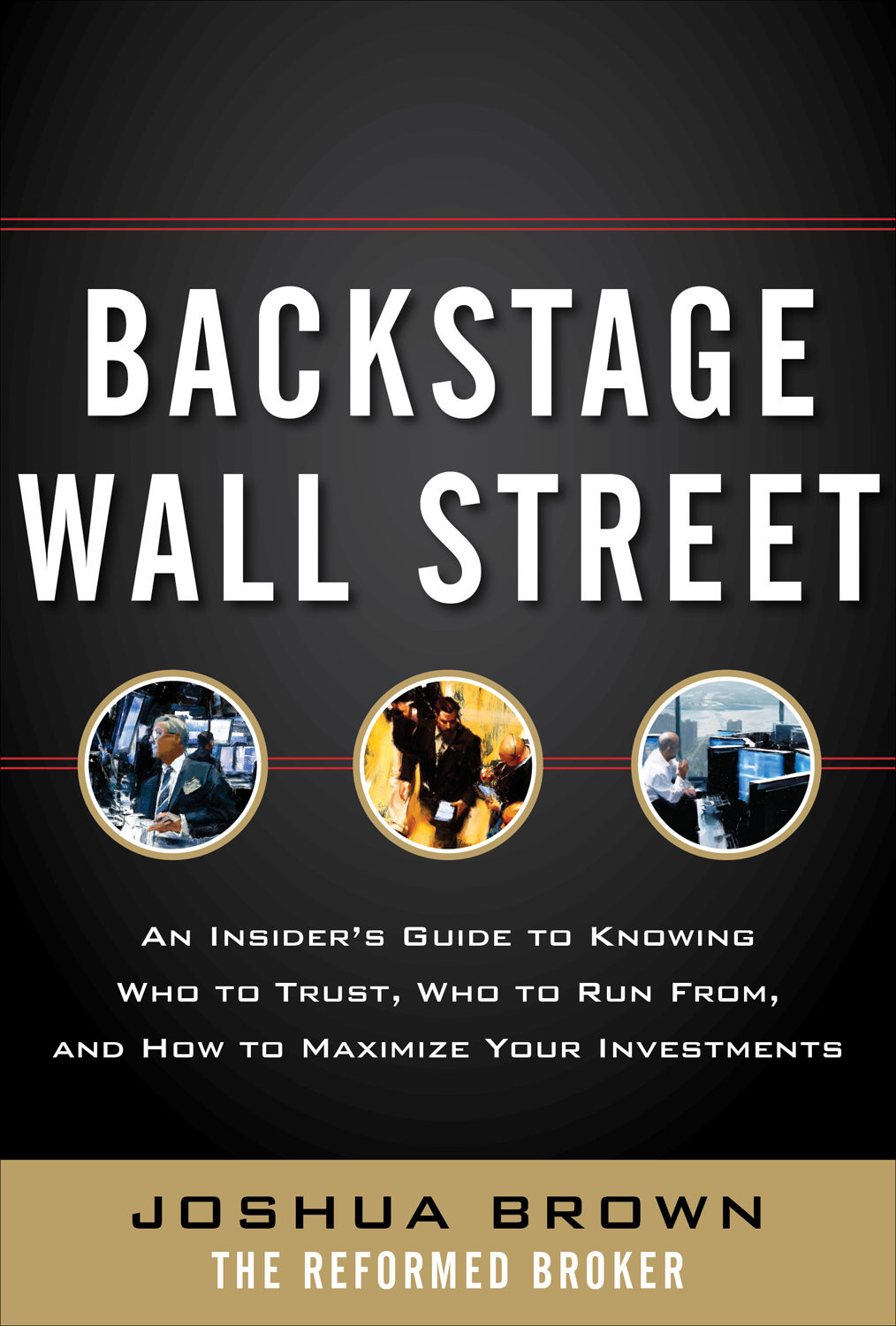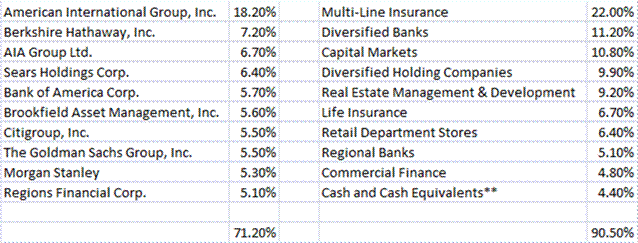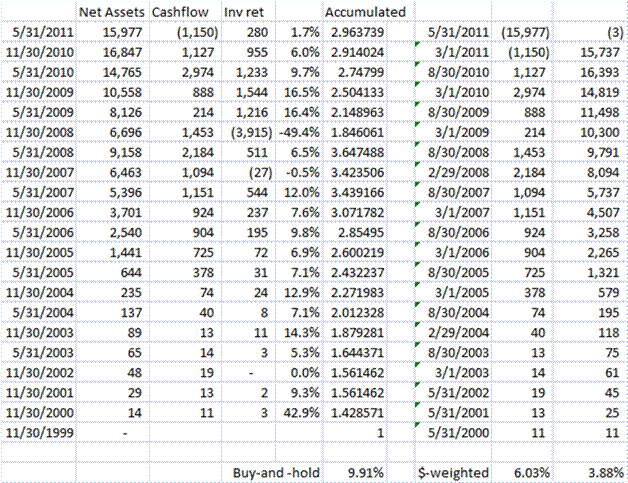Book Review: Backstage Wall Street

I have long wanted to see a book that would teach ordinary investors how to avoid being cheated by those that create/sell financial products.? If this book isn’t it, the one that surpasses it will be astounding.? If Wall Street is a show, this book gives you a peek behind the curtain.
This book is really four mini-books in one:
1) How the author became a broker, and the ethical difficulties that were forced on him in the process.
2) The difficulties faced by do-it-yourself? investors, and the benefits of exchange-traded funds [ETFs].
3) On Brokerages, and all their conflicts of interest, culminating in the straight line pitch.
4) Investments to avoid, and advice from the wise.
That it is four in one is not a weakness but a strength.? Wall Street has many ways to skin investors, and each section provides insights that different people will benefit from.? It is a more comprehensive book in its short 240 pages as a result.
On Brokers
The first part of the book describes Wall Street as it was and is, with all of the players and their motives.? Josh spares no one; the tone of the book is cynical, but not unduly so, noting all of the problems with a profane sense of humor.? Some of the funniest bits of the book are recollections of conversations with greedy parties seeing an edge.
There is a certain level of despair for young brokers as they “cold call,” knowing that if they don’t succeed, they will be let go, but driven by the possibility of riches should they succeed.? Those who are successful gain money, prestige, bragging rights, and some level of freedom from tight control.
I have my own experience with this. though mostly on the institutional side where I told such brokers “Why would my client want that?!”? It’s astounding what level of deception those who sell investments will engage in, until they realize you can’t be conned, and then they use your ideas to con others.? (The institutional brokers only make money on transactions; if they know you are smart, they facilitate your ideas at the expense of those less talented.? Ugly, I know, but I didn’t invent this.)
On Do-it-Yourselfers
Now, if you are a total “do-it-yourselfer” like I was in the ’90s, where I researched and bought my own stocks for myself, with some success, this is not for you.? This is for those who research and use mutual funds and ETFs.? It goes into the history and development of asset management fund structures, explaining why they are how they are.
He also describes how the modern era came into existence with discount brokerages in the ’70s, and how during the bull of the ’90 it morphed into anyone can make tons of money, just buy stock!? One thing Josh does not talk a lot about, but was significant, was how when fixed commisions ended, the real reason for maintaining research staffs died.? And, when tick sizes moved from a eighth to a sixteenth to a penny, the reasons for having market makers and specialists dried up.? But you can’t cover everything.
One particularly funny part is page 110, with its real-life definitions of fund types.? Josh is at his best in the section where goes after leveraged and inverse ETFs, where a lot of investors lose money because they are meant to track daily performance of indexes, and generally lose money for those that hold them long-term.? He is similarly good when he criticizes the proliferation of ETFs that are too unique, and will never get a broad following.
On Brokerages
Brokers position themselves as experts, when they are really order-takers.? They hire analysts that are not that good on average, and issue more buy than sell opinions, which facilitate the investment banking and trading businesses.? It talks about the stories that brokerages tell in order to captivate people and make them invest.
And then, Josh discloses the “Straight-Line Pitch,” which has been used on many investors to make them invest with the brokerage.? I have to admit, given some of the initial publicity on this point, and my own experience with brokers, I was dubious about this part of the book, and, Josh leaves it to the end — this is the climax!
I was pleasantly surprised, and I would recommend that all investors read chapter 20.? Why?? To immunize yourself from the clever talk that boxes you in as they offer slick answers to your objections.? That is a major reason why I read books on marketing: I can’t be tricked!? (But it does force me to do my own research.)? If you don’t want to be tricked by clever brokers, read chapter 20.? It isn’t necessarily the best chapter of the the book, that will depend on your own needs, but chapter 20 is unique.
Oh, and why have I not experienced this? Being a total do-it-yourselfer, I told brokers that I knew better than they did; it led to some weird conversations as they found I knew more about it than their talking points.
Investments to Avoid — Advice from the Wise
Most bad investments are either volatile or illiquid.? Why do brokers sell illiquid investments?? Because they get high commissions.? Same for insurance agents.
Then there are investments that sneak between the regulatory cracks, like Chinese reverse mergers, Special Purpose Acquisition Corporations, and anything with secondary guarantees, or the sale of options to enhance income.
Ask the broker this: who can I sell this to if I don’t like it someday?? Who makes an active market in this?? Any pause on this, and don’t buy.? No pause, but an answer — write it down, and check it out.
In one sense, part of the answer to the problems this book brings up is to realize there is no urgency.? If it is a good idea today, it will be good a week from now, let me talk with smart friends and figure out if the idea makes sense.
As for advice from the wise, he invites about eight of his friends to opine on a variety of topics.? Most of them are well-known, but at least a few of them are obscure, unless you are in the business.? I found the counsel to be sound, aside from an obscure former actuary who writes on investments.
Quibbles
On page 118, he talks about how Vanguard would have been a natural for the ETF business, and how Bogle delayed them from getting in.? This is true, but Bogle resigned in 1999; I was at a dinner for his retirement in 1998 in Philadelphia, and met him and Brennan, his successor.? The first Vanguard ETF was created in 2001, VTI is the ticker.? Vanguard did not play a large role in ETFs until 2005, but to say they weren’t in the business is not correct.
Also, ETFs are not as good as they seem, because average investors in them trade them wrong, buying high and selling low.? ETFs do not correct for bad investor timing, even if they are lower-cost.
Who would benefit from this book: If you aren’t a total Do-it-Yourselfer in investments, you can benefit from this book, because it will teach you about the motivations of those who try to sell investments to you, and those who manage money for you.? If you want to, you can buy it here: Backstage Wall Street: An Insider?s Guide to Knowing Who to Trust, Who to Run From, and How to Maximize Your Investments.
Full disclosure: The author is a friend of mine, so I asked for the book.? He said ?yes? and he sent it to me.
If you enter Amazon through my site, and you buy anything, I get a small commission.? This is my main source of blog revenue.? I prefer this to a ?tip jar? because I want you to get something you want, rather than merely giving me a tip.? Book reviews take time, particularly with the reading, which most book reviewers don?t do in full, and I typically do. (When I don?t, I mention that I scanned the book.? Also, I never use the data that the PR flacks send out.)
Most people buying at Amazon do not enter via a referring website.? Thus Amazon builds an extra 1-3% into the prices to all buyers to compensate for the commissions given to the minority that come through referring sites.? Whether you buy at Amazon directly or enter via my site, your prices don?t change.


 This is two books in one, and very well done.? The main part of the book explains risk and uncertainty in general terms, such that most people can understand it.? But for those that can deal with complex math, the latter part of the book offers a lot of additional firepower.
This is two books in one, and very well done.? The main part of the book explains risk and uncertainty in general terms, such that most people can understand it.? But for those that can deal with complex math, the latter part of the book offers a lot of additional firepower.


